Maybe it’s a sales page you want to get just right. Maybe it’s the content for your new course. Maybe you’ve decided to self-publish a book to support your credibility and your brand. Whatever it is, you want to hire an editor to make sure everything looks good and won’t get you annoying emails and one-star reviews about typos.
The danger of hiring an editor for your work — and how many of us have this experience? — is that the editor may take more liberties with the text than you’d like, for the sake of “good editing.”
Rules become more important than the content, even if those rules are outdated. Your word choice is “polished” within an inch of its life.
There are far too many grammar junkies masquerading out there as editors, luring you in with their promises of free work, fast turnaround, and attention to detail. What they really mean is they will tear your manuscript up so much that it won’t even sound like you anymore. Because they’ve become self-proclaimed experts in one very narrow definition of “proper grammar” and “good writing,” and they will take a hacksaw to your manuscript to make it fit within that tiny worldview.
You must avoid these people at all costs. And today, I’ll show you how.
Look for a subversive editor
The editor you want to hire lives by the mantra the inimitable Carol Saller spells out in her book The Subversive Copy Editor: “First do no harm.”
In other words, no prescriptive rule of grammar, style, or syntax is worth dismantling an author’s voice. All good editors know that preserving the spirit of the author is the most important task of editing. We want to make sure your work sounds like you. Not like the Oxford English Dictionary.
A not-good editor, on the other hand, is a disaster waiting to happen. Your words may be transformed into language that’s stiff and stilted, everything might be rearranged, and you may even be responsible for high fees for the pile of shreds you get back. All in the name of “editing.”
(If it hasn’t happened to you, it’s probably happened to someone you know.)
It’s not hard to find an editor. You just need to go into the search armed with some knowledge and advice.
Note: this is about hiring a freelance editor yourself, not working with an editor through a publisher. Two different, but related, animals.
Step 1: Find your candidates
Finding an editor might be easy. You may know someone, or you might have one recommended to you.
The first thing to do if you don’t have a go-to editor is ask for recommendations. If you don’t already know a friend who’s an editor (and I’m not talking about so-and-so from the office who likes “proofreading” things), ask your circle of colleagues if they know any editors they can recommend. A high recommendation is a great first step.
If no one in your network can recommend someone, consider casting a wider net. Post in writer-oriented Facebook or LinkedIn groups and send out a call on Twitter. Contact people whose books and products you like and ask who their editor is. If you want to post an ad, post one at the EFA — it’s the best, most highly qualified candidate pool out there. You’ll get a flood of candidates, so be prepared to be inundated, with responses coming in for a couple of weeks if you don’t put a time limit in the ad.
This part seems like it could be a long process, but it doesn’t have to be. If you’re plugged into the content space already, it’s highly likely you’ll turn up a few good editors with your very first inquiry.
Step 2: Arm yourself with the right questions
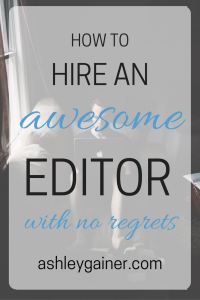 Hiring an editor is a lot like hiring any other professional, but it’s also a bit different. Editors are working with your words, which are an extension of you. They’re taking something you created, adjusting it, and handing it back to you, ideally in the form it’ll go public. It’s personal and it’s permanent. It’s kind of a big deal.
Hiring an editor is a lot like hiring any other professional, but it’s also a bit different. Editors are working with your words, which are an extension of you. They’re taking something you created, adjusting it, and handing it back to you, ideally in the form it’ll go public. It’s personal and it’s permanent. It’s kind of a big deal.
You need to be sure you’re working with the right person.
And to know you’re working with the right person, you need to get some key information up front.
Things you should ask your prospective editor:
- Do you do a sample edit?
- What is your default style if no guide is specified? (There’s no “right” answer to this, but you’ll probably see AP or Chicago/CMOS from a legit editor.)
- What is your preferred dictionary? (Again, no “right” answer but many real editors turn to Merriam Webster. My personal favorite is the American Heritage Dictionary.)
- What types of projects or manuscripts have you already edited?
- When could the project begin and what’s the turnaround time?
- What word processing software do you use, and what editing tools? (Look for whatever you use. Most commonly it’s MS Word or Google Docs, and you definitely want to work with someone who uses a Track Changes feature.)
- What are your rates and payment terms?
This probably goes without saying, but you want to work with someone who has a confident answer for each of those questions.
Step 3: Evaluate the candidates
As a long-time editor for small businesses, nonprofits, authors, and solo-preneurs of various sorts, I know how to behave the way a good editor should. Here are some signs you’re looking at a good editor:
1. Requests a sample edit before nailing down a price
Many legit editors will require a sample before sending you their rates. This is what you want. Do not, under any circumstances, hire an editor without seeing a sample edit. A sample edit shouldn’t be long — think 500-2000 words. It needs to be an “indicative” sample taken from somewhere in the middle of your draft, not the beginning or end (where you’ve probably spent a bit more time).
Sample edits are useful for you, to see whether or not you like the editor’s style and method of working. They’re also extremely useful for the editor, who can now offer you a quote or a good ballpark estimate for the total project. Not being blindsided by high fees for edits you hate is a good thing, and experienced editors know this is generally the best way to work.
Once you’ve got the sample edit back, take a look. If you don’t like the changes, say goodbye. If you do like the changes, move forward.
A word of caution here: do not be the person who gets the whole thing edited piece by piece via sample edits. That’s not only extremely tacky, it’ll bite you in the rear when you cobble the final result together. Every editor is different, and the varied editing styles won’t necessarily fit side by side. You’ll end up with a jarring, disjointed, completely inconsistent manuscript. (Then again… if that’s how you proceed, it’s what you deserve.)
2. Clarifies the type of editing you need
There are different kinds of editing. There’s developmental editing (I have an idea or even a draft, but it needs a lot of help); copy editing or line editing (my draft is solid but I need help with wording here and there, punctuation, etc.); and proofreading (my graphic designer has returned the final PDF to me and I want to be sure everything is where it should be).
For example, you’ve got a rough draft that you know needs a lot of work, you’re probably looking for a developmental editor. But if you’re pretty confident with the content but want to make sure your grammar and punctuation adhere to Standard American English (SAE), that’s a line edit. Developmental editors don’t necessarily do copy editing, and copy editors don’t always take on developmental projects. (For the record, I don’t do developmental editing.)
3. Talks about style
Editors deal with something called “style,” which has nothing to do with our (admittedly hit-or-miss) fashion sense. Style has to do with the specific “rules” applied to any given manuscript, including grammar, punctuation, spelling, capitalization, and the like. Think AP Style or MLA Style, something you’ve probably run across here and there.
Your editor may ask you if you have an in-house style guide, if you prefer a particular style, or if you’d like a style sheet. If you draw a blank at any (or all) of these questions, a good editor will know what to do.
4. Provides excellent testimonials
What you’re looking for in an editor’s testimonial is something along the lines of “This person gave me a great manuscript in perfect shape and didn’t mess with my words too much.”
Another bit of research you can do is looking at any reviews you can find on a book the person you’re considering has edited. One of my best editing testimonials came from an Amazon review of a book I edited.
Similarly, you want to see positive testimonials from clients whose projects are similar in length or scope to yours. Someone who mostly edits blog posts and newsletters may not have the skill set required to do a good editing job on your 120,000 manuscript.
How about a template?
I’ve been an editor for years, and it always amuses me when people say they are nervous to write emails to me because they’re afraid I’ll judge them critically based on how they write.
Here’s the thing: editors are normal people. And we’re probably so happy to get your message that we couldn’t care less about how perfectly it’s written (or not). Besides, editing is our job, not yours. For the same reason we don’t get embarrassed when we need to call the plumber, you shouldn’t be embarrassed when writing to an editor.
If you’re ready to begin your search and you’re planning to contact your potential editor(s) directly rather than posting a gig on a job board, here’s some language you can borrow straight from me:
Dear [name],
I need an editor for my [newsletter/memoir/science fiction trilogy] and your editing services were recommended to me by [name]. The project is about [100,000] words long and I need someone to [turn 15 blog posts into a cohesive book / help me make sure everything is concise and in order / weed out any typos before I hit the “publish” button].
Please let me know when you would be able to finish the project and what your rates would be. I’ll be happy to send any additional information you’d need.
Thanks very much,
[your name]
There you have it! Use this advice from a seasoned editor who knows how NOT to ruin your copy to go find yourself a good editor. And if you think I’m the right person, don’t hesitate to get in touch! I love working with go-getters like you.

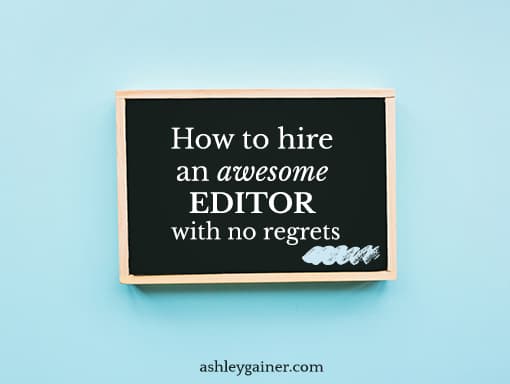

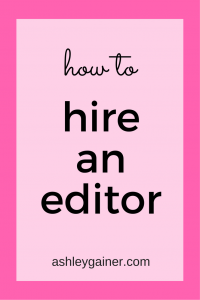

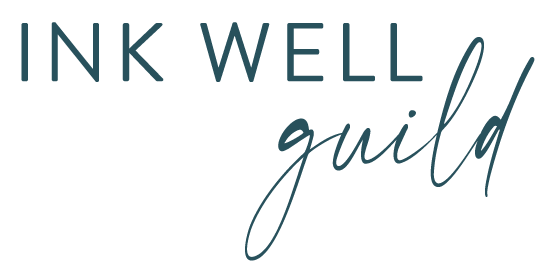
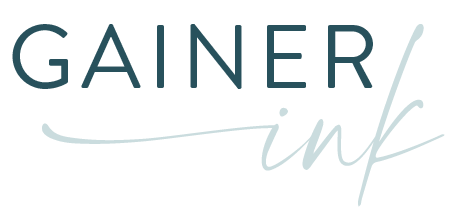
This was a great post. Simple and concise and exactly what I needed to read before considering the daunting task of finding a qualified editor! Thanks
Ashley, from one editor to another, this was a FABULOUS piece!
Wording Well is both my business name and what I do.
My clients don’t always ask me the questions you suggested they ask, but I always ask to see a piece of potential clients’ writing so that I can determine whether or not I want to work on their project.
Because I also offer author assistant services via Wording Well, I ask them additional questions, such as:
1. Where are you planning on selling your book?
2. Are you selling it as an e-book, a print book, or both?
3. Will you require formatting? (This is another service I provide, as part of my author assistant services.)
Plus, I ask a few more questions, especially if they don’t ask me them (regarding turnaround times, to see if they have realistic expectations, etc.)
Out of curiosity, why don’t you have a Testimonials page on your website, Ashley? I highly suggest you add one!